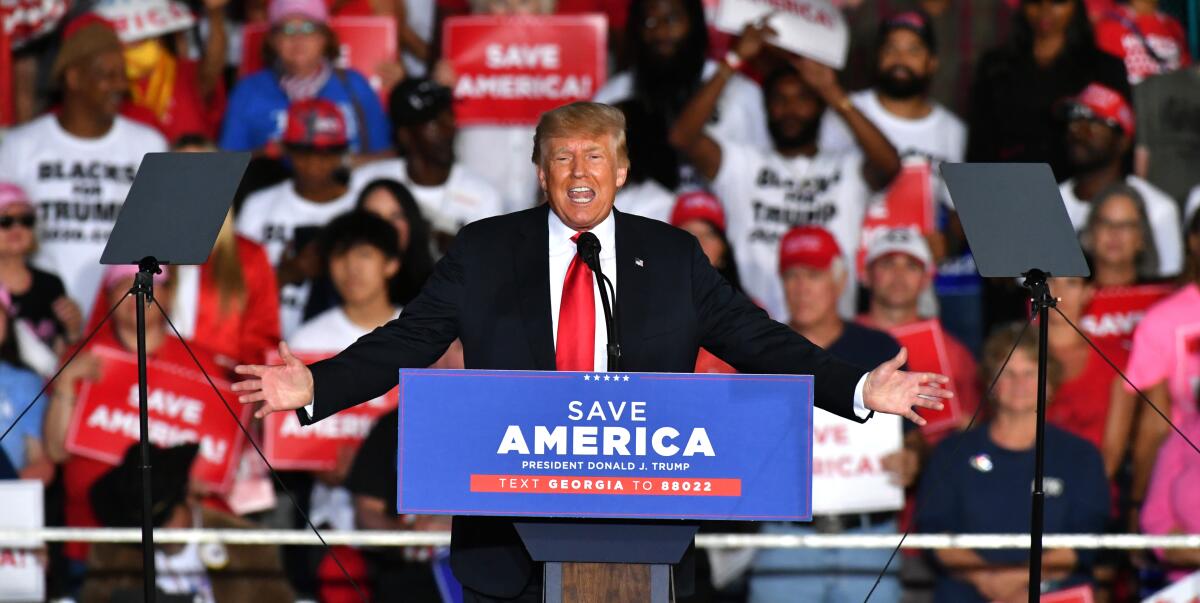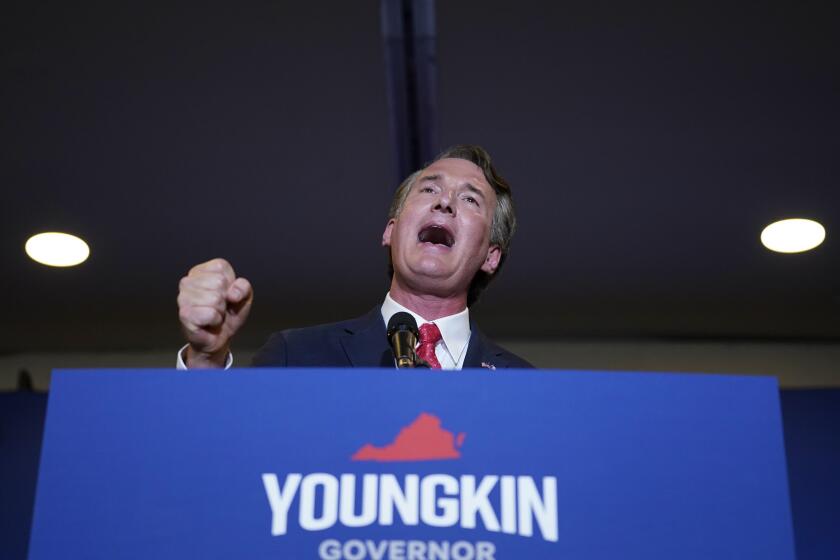Column: Trump latest warning sign: Stacking election posts with Big Lie supporters

What Donald Trump is saying is bad enough: For 13 months, history’s sorest loser has been repeating his lie that he was robbed of reelection, and undermining the faith of millions of Americans in their democracy, including three out of four Republicans who buy his poison.
What Trump and his allies are doing, however, is perhaps worse: They’re working to rig the next presidential election for him.
This activity, while mostly out in the open, has been little noted because seeing the full picture requires connecting dots in swing states nationwide, each dot representing interventions by Trump or his minions to affect some of the country’s most obscure public offices, like county vote-canvassing boards and precinct judgeships.
As Trump learned in 2020, all elections — whether for town manager or president — are run by local and state officials, each guided by separate laws and regulations and their own discretion. In 2020, some Republican officials involved in the election process stood up to Trump’s overt pressure to “find” votes for him or nullify some of Joe Biden’s, despite death threats that are ongoing.
Clearly, Trump wants to prevent such pro-democracy heroics from happening again if — when — he runs in 2024.
Opinion Columnist
Jackie Calmes
Jackie Calmes brings a critical eye to the national political scene. She has decades of experience covering the White House and Congress.
So he is now paying close attention to local and state races for offices that affect elections — and regularly issuing endorsements for candidates for local election administrator, state representative, secretary of state and state attorney general. He seems to have one criterion — that the Republican endorsee echo his Big Lie — and he’s especially intent on revenge against those who defied him in 2020, like Georgia Secretary of State Brad Raffensperger.
“We have people who don’t actually believe in our elections running to have control over them,” Joanna Lydgate told me. Lydgate is the co-founder and leader of a nonpartisan group, States United Democracy Center, which works with state and local officials to ensure fair elections and monitor threats. She said the actions — along with new vote-suppression laws in some states — could amount to “election hijacking.”
Consider Michigan. Its 16 electoral votes went to Biden. A report by the Republican-controlled state Senate found no widespread fraud. Yet Trump continues to claim otherwise. Now, he’s trying to change the membership of bipartisan county canvassing boards, which certify each county’s votes. He is also seeking to elect more Trumpers to the state legislature, in hopes of lining up lawmakers willing to oppose election results he considers fraudulent.
After the 2020 election, Trump contacted the two Republican canvassing board members in Wayne County, Michigan’s largest and the home of heavily Democratic Detroit, after they voted to certify the county vote for Biden. They subsequently tried to rescind their votes, but the earlier certification vote stood.
One of those GOP canvassers was recently replaced by a pro-Trump Republican who’d been nominated by the local party. He said he wouldn’t have voted to certify the county results for Biden, who won Michigan by more than 154,000 votes and had a margin in Wayne County of nearly 333,000.
According to the Detroit News, local parties picked new Republicans for the canvassing boards in eight of Michigan’s 11 largest counties. In several counties, they passed over Republican incumbents who wanted to be renominated — a highly unusual move for what historically have been low-profile, mostly ministerial jobs. An incumbent in Genessee County said that she believes she was ousted for defending the 2020 results. A new Republican appointee in Macomb County, the state’s third-largest, tweeted last year that Trump should suspend the electoral college and order military tribunals to investigate fraud.
For Michigan secretary of state, the officer in charge of elections, Trump’s candidate, Kristina Karamo, last year became well known for her false fraud allegations. She later claimed the Jan. 6 insurrection was the work of left-wing anarchists disguised as Trump supporters. “She is strong on Crime, including the massive Crime of Election Fraud,” Trump tweeted in his endorsement in September. Similarly, he’s been churning out endorsements for the Michigan Legislature, about a half-dozen just in the past month. Typical was the one for Republican Mick Bricker, who, Trump wrote, “knows there was systemic voter fraud in the 2020 Election, and he can’t wait to expose” it.
The party stands to lose control of the House and perhaps the Senate in the 2022 midterms. Time to stop the infighting.
Trump’s efforts to stack election administration jobs should be “a great big flashing red warning sign,” Jeff Timmer, a former chairman of the Michigan Republican Party, told the Washington Post. “The officials who fulfilled their legal duty after the last election are now being replaced by people who are pledging to throw a wrench in the gears of the next election.”
Similar efforts by pro-Trump forces have been underway in other swing states, including Georgia, Arizona, Wisconsin and Pennsylvania.
“We’re taking over the Republican Party with the precinct committee strategy. We’re taking over all the elections,” Trump ally Stephen K. Bannon said on his “War Room” podcast Nov. 12, the same day he was criminally charged for defying a House subpoena from the committee investigating the Jan. 6 insurrection.
As Lydgate says, “Heads up, America.” Trump and his Republican enablers are not only fixing the rules of the game with new election laws in a number of battleground states, they are also trying to change the players in local election offices as well as the referees in Republican-controlled state legislatures.
Trump may not win the presidency if he runs again, but one thing is certain: He will cause chaos and further threaten democracy in the process.
More to Read
A cure for the common opinion
Get thought-provoking perspectives with our weekly newsletter.
You may occasionally receive promotional content from the Los Angeles Times.













